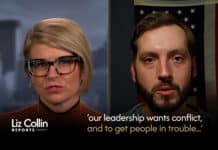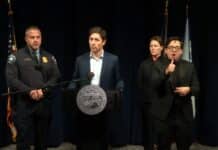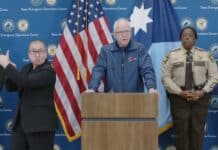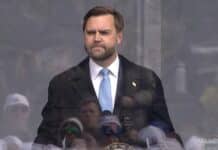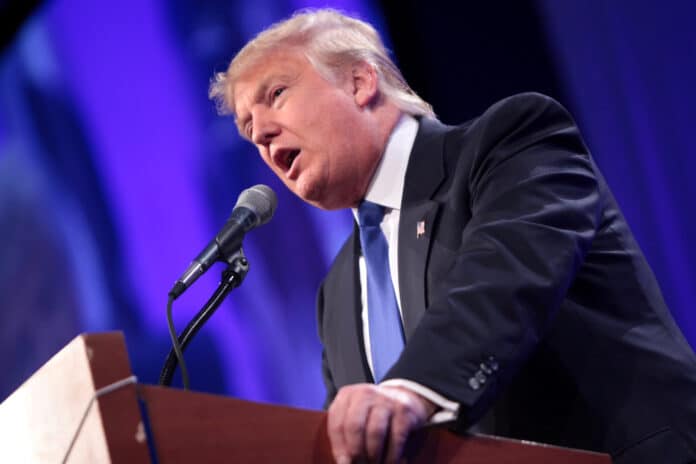
Instead of criticizing Ron DeSantis for his handling of Covid, Donald Trump should publicly criticize his own decision-making in the early stages of the pandemic. He probably won’t do it, but he should. And who knows? Such a speech might well rebound to his political benefit as the primary season heats up.
Way back when, meaning back in those now prehistoric days of the late winter of 2020 when news of the virus first escaped, no one knew what the right response should be.
“No one,” by the way, does not just refer to our political leaders. That large category also includes, nay it especially includes, our community health experts. High on the list of these “Know Not Enoughs” (as opposed to know nothings) would have to be Mr. Science himself. That would be Dr. Anthony Fauci, who initially offered conflicting, even contradictory, advice about such matters as masks and shutdowns before deciding that a shutdown was absolutely necessary.
We now know a whole lot more than we once did about this pandemic. Among the things that we know today is that the shutdown response turned out to be a very costly mistake. In other words, Dr. Fauci seems to have been right before he was wrong.
Early on, President Trump’s instincts seemed to be telling him to reject all calls for a shutdown. In the end, he spurned his instincts. In a few more words, he was also right before he was wrong.
So why not lay all this out to his fellow citizens? Why not simply admit that a mistake was made? To be sure, this was a very big mistake, and to concede having made it would be a very unTrump-like thing to do. But Donald Trump could pull this off in a very Trumpian manner. Here’s the opener: “I got rolled by Tony Fauci.”
Where to go from there? First of all, no false braggadocio. The infamous phone call that triggered the first impeachment may or may not have been “perfect,” but there was nothing that could approach perfection here. Everyone was flying blind.
And no abject groveling or begging forgiveness either. Just concede that a serious mistake was made. That would not only be the right thing to do, but it might also prove to be the politically smart thing to do. After all, look what it did for a president by the name of Kennedy in the aftermath of the Bay of Pigs fiasco.
But that isn’t quite that. Far from it. In the rest of that same speech he should give us a glimpse into some very unTrumpian behavior before saying a few more unTrumpian things. For starters, he could apologize. Heck, he could even ask for forgiveness. To top that off, he could let us into his inner sanctum. Surprisingly or not, he could reveal to us that the entire covid experience led to some thoughtful reflection. He should tell us that. More than that, he should add that he’s actually learned a few things along the way. And having done so, he could then try his hand at teaching us a few things. One of those things would concern the limits of science.
He could begin the heart of his speech on a sneakily Trumpian note by borrowing the words of another president whose last name also began TRU. That would be Harry Truman, who liked to remind himself — and others — with these few words on his desk: “The Buck Stops Here.”
Could Trump do something like this? I don’t know. But he should.He doesn’t have to trash science — or himself, for that matter. But he could help himself and the country — if he put science in its place by telling us that he should have put science in its place in the spring of 2020.
Of course, he could go on, I’m not telling myself or anyone else to ignore science. Of course, I should listen to what the scientific experts have to say. But they shouldn’t have the last word. Nor should their word be trusted as the final word when it comes to making what are essentially political decisions. That should always be the case, but it’s especially the case today when science itself has become infiltrated with politics.
In the end, meaning where the buck stops, presidents need to trust themselves to make the right call about what are essentially political and, therefore, societal matters. In other words, Trump should lower himself by conceding his error in judgment, while at the same time lowering science by simply putting it in its place.
If Trump then wants to elevate himself by telling us that, having learned his lesson, he’s ready to be trusted to trust his instincts, why not? He is Trump, after all. Besides, all politicians should be skeptical about all expertise, including scientific expertise, maybe even especially including scientific expertise, when it comes to making what are essentially political decisions.
More than that, Trump could then sound a note that is at once Trumpian and something other than that. He could express confidence in his political judgment, while also attempting to teach us about the dangers of making what might be termed a Faucian bargain. Faucian bargain? That would be going along with Dr. Fauci’s insistence that his claims cannot — and should not — be questioned or doubted because he “represents the science.”
It’s one thing to listen to what a scientific expert might have to say, but it’s quite another thing to follow the science simply because a self-proclaimed scientist insists that you should do so. Something called science might well be true, but it is never the whole truth or the only truth. For that matter, science can never be the final truth. And it is certainly never the infallible truth.
Now, we’re admittedly slogging our way into some very UnTrumpian territory here, which is all the more reason that The Donald might be reluctant to head in this direction. But that’s all the more reason that someone who is well outside not just the realm, but even the aura, of science should go there. This is especially so when the someone in question has held elective office in the past and hopes to be a political leader once again.
To be sure, no past or future political leader, whether in a republic or otherwise, has the final claim on truth. But such leaders are charged with looking at the big picture, as opposed to a slice of that picture. Science alone is never the whole picture, let alone the whole of the big picture. Science alone is nothing more than a slice of the picture, however big or small that picture might be.
At last report Donald Trump has never made a claim anywhere close to the grandiosity of the Faucian claim. He has never claimed that he has the whole truth or that his is the most important truth worth knowing. Nor has he ever insisted that his edicts or recommendations ought to be followed because he represents something larger than himself.
Let’s be honest here When it comes to world rankings on the arrogance scale, Donald Trump can’t quite match Anthony Fauci. At the same time, Trump would be likely to edge out Fauci on the humility scale, even though neither could ever challenge St. Francis or Mother Teresa.
To be sure, a large part of a president’s job does involve representing something larger than himself. The president, after all, represents the American people. This task is at once necessary and necessarily messy. It can also be ultimately humbling.
Among the necessary skills for the job are listening and learning, skills that Trump had to have developed and honed as, guess what, a developer. Fauci, on the other hand, has spent a career being listened to—and deferred to. And oh yes, he’s never had the ultimately humbling experience of ever stooping to ask anyone to vote for him.
Now let’s be honest one last time. Being a good listener is no guarantee that one will be a good leader. But it is a good start — especially when coupled with good instincts, which clearly Trump has. How else to explain his victory in 2016? That would be a victory over the leading lights of the political class of both major parties.
So why not honestly and directly tell the American people that you should have trusted those same instincts in the spring of 2020 — and that, if given a second chance to run for a second term, you won’t let the Tony Faucis of the world roll you again?
After all, the messiness of leadership ultimately involves trusting your instincts more than trusting any other single thing, especially if that single other thing seeks to elevate itself to stand as the only thing worth trusting.



